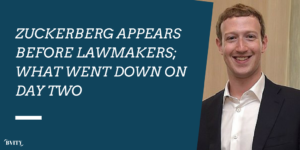On day one, citizens were plagued with worry that Congress really didn’t understand the internet as they were unable to ask the right and needed questions concerning the issues raised so deemed the people. However, after day two and a cumulative 10-hour interview before a Congress panel, that view changed. Two privacy bills were introduced to tally with the interviews; One to make data collection on students who use school tablets and laptops harder and the other to require companies, before collecting and or sharing user data, obtain clear permission from users.
It was mentioned that if the FTC, Federal Trade Commission, investigates the company and finds any violations regarding the Cambridge Analytica scandal from Facebook, the company could be slammed with a huge fine. Zuckerberg assured that all violations made were by the political firm as he was of the view it was “a closed case” after their talk. It was also why he did not alert the FTC of the breach.
Also, some believe the company is a monopoly, Zuckerberg has said otherwise. During a monopoly question from Republican Senator Lindsey Graham, National Public Radio host Noel King got Greg Ip, the chief economics commentator for The Wall Street Journal, on the line. Mr. Ip explained that Facebook indeed did not have competitors, as Zuckerberg said, because of the app features which most similar apps do not have, the massive friend network it offers and the constant new features that pop up.
And that Facebook could be called a monopoly or a monopoly-like company because of its market share seeing as how 87% of adults use the app or its products, its extremely high-profit margins which other companies would find difficult to meet and its network effects which are basically a constant influx of users as more people use the app. However, Zuckerberg is right in saying that it is not a monopoly because of the company’s age and the type of industry it is.
Also, regulating the company would be difficult as Congress does not want to infringe on First Amendment rights or hurt Silicon Valley. However, constraints can be placed on it or it could be broken up, as said by Greg.

